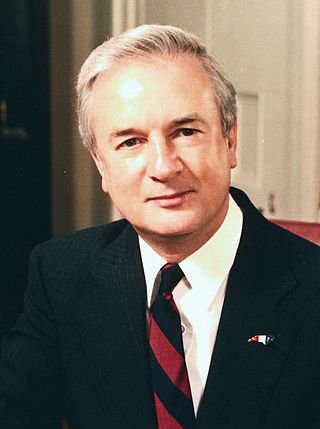
James Baxter Hunt Jr. is an American politician and retired attorney who was the 69th and 71st governor of North Carolina. He is the longest-serving governor in the state's history.

Sarah Elizabeth Parker is an American judge who served as the chief justice of the North Carolina Supreme Court from February 2006 until August 2014.
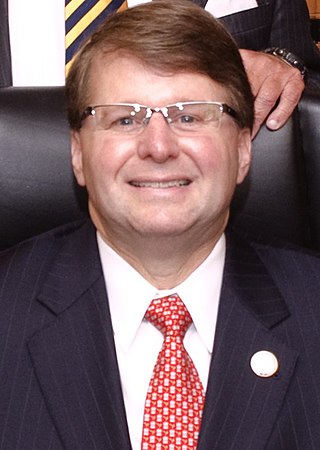
Mark D. Martin is an American jurist who served as the chief justice of the Supreme Court of North Carolina from 2014 through 2019. He was appointed by North Carolina Governor Pat McCrory to become Chief Justice on September 1,2014 upon the retirement of Sarah Parker. Martin was already running for the seat in the 2014 general election.
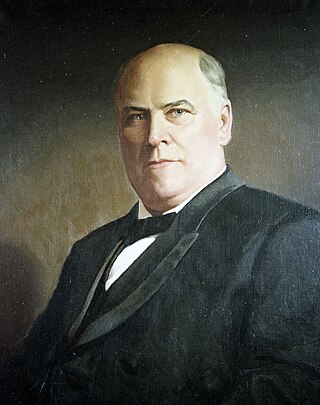
Robert Brodnax Glenn was an American lawyer,prosecuting attorney,U.S. Attorney,and politician who served as a state senator and as the 51st Governor of the U.S. state of North Carolina from 1905 to 1909.
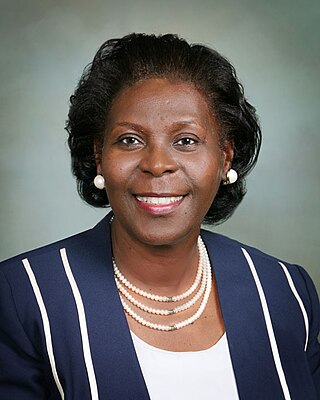
Patricia Ann "Pat" Timmons-Goodson is an American judge and politician who served on the North Carolina Supreme Court from 2006 to 2012. She previously served on the United States Commission on Civil Rights and is a former nominee to be a federal judge for the United States District Court for the Eastern District of North Carolina. Timmons-Goodson ran for Congress in 2020.
J. Douglas McCullough is an American lawyer and former judge of the North Carolina Court of Appeals. McCullough retired in 2017.
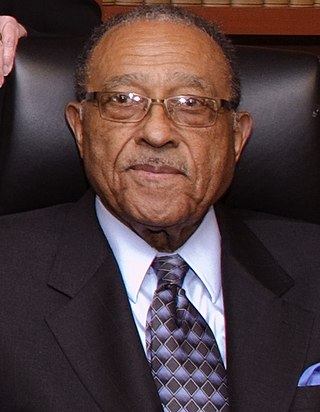
Henry E. Frye is an American judge and politician who served as the first African-American chief justice of the North Carolina Supreme Court.
Womble Bond Dickinson is a transatlantic law firm formed in 2017 as a result of a merger between UK-based Bond Dickinson LLP and US-based Womble Carlyle Sandridge &Rice,LLP. The combination followed a strategic alliance announcement made in 2016. The firm has 32 locations across the United States and the United Kingdom offering services in 12 different sectors.

One justice of the North Carolina Supreme Court and six judges of the North Carolina Court of Appeals were elected to eight-year terms by North Carolina voters on November 4,2008. This coincided with the presidential,U.S. Senate,U.S. House,gubernatorial,and Council of State elections.
Samuel James Ervin IV is a North Carolina lawyer and jurist who served on the North Carolina Supreme Court from 2015 to 2022. He previously served as a state Utilities Commissioner and as a judge of the North Carolina Court of Appeals. He is the grandson of U.S. Senator Sam J. Ervin,Jr. and the son of U.S. Court of Appeals for the Fourth Circuit Judge Sam J. Ervin III.

One justice of the North Carolina Supreme Court and five judges of the North Carolina Court of Appeals were elected by North Carolina voters on November 2,2010,on the same day as the U.S. Senate election,U.S. House elections,and other state-level elections. North Carolina judicial elections are non-partisan. Terms for seats on each court are eight years. All incumbent judges and justices who sought re-election won their respective races,except for Judge Cressie Thigpen of the Court of Appeals,who had been appointed shortly before the election and lost North Carolina's first statewide election to use Instant-runoff voting.
Thomas David Schroeder is the United States district judge of the United States District Court for the Middle District of North Carolina.
J. Phil Carlton was born on January 14,1938,in Rocky Mount,North Carolina. He attended South Edgecombe High School in Pinetops,North Carolina,where he served as student body president. Carlton received his bachelor's degree from North Carolina State College in 1960. In 1959-60 he served as an assistant campaign manager in the gubernatorial campaign of Terry Sanford. He received his J.D. from University of North Carolina at Chapel Hill in 1963. He practiced law in Tarboro,NC from 1963 to 1968 and served as administrative assistant to Federal Judge L. Richardson Preyer in Greensboro,NC in 1964.

One justice of the North Carolina Supreme Court and three judges of the North Carolina Court of Appeals were elected by North Carolina voters on November 6,2012,concurrently with the elections for Governor and other offices. North Carolina judicial elections are non-partisan. Terms for seats on each court are eight years. In three of the four races,incumbents were re-elected to their seats,but incumbent Court of Appeals Judge Cressie Thigpen was defeated by Chris Dillon.

Peter Samuel Brunstetter is a former Republican member of the North Carolina General Assembly who represented the state’s 31st Senate district,including constituents in Forsyth County and Yadkin County,North Carolina. He resigned from the legislature,effective Dec. 15,2013,to become executive vice president and chief legal officer for Winston-Salem-based Novant Health. He served with Novant Health until November 2018. He served as the Chief Operating Officer of the University of North Carolina System,headquartered in Chapel Hill,NC,from January 2019 to July 2020.

Four justices of the seven-member North Carolina Supreme Court and four judges of the 15-member North Carolina Court of Appeals were elected by North Carolina voters on November 4,2014,concurrently with other state elections. Terms for seats on each court are eight years.

Lucy Noble Inman is a judge of the North Carolina Court of Appeals and formerly served as a special North Carolina Superior Court judge. She won election to the appellate court in a statewide race on November 4,2014.

One justice of the seven-member North Carolina Supreme Court and five judges of the 15-member North Carolina Court of Appeals were elected by North Carolina voters on November 8,2016,concurrently with other state elections. Terms for seats on each court are eight years.

Three justices of the seven-member North Carolina Supreme Court and five judges of the 15-member North Carolina Court of Appeals were elected by North Carolina voters on November 3,2020,concurrently with other state elections. Terms for seats on each court are eight years. These elections were conducted on a partisan basis.

Two justices of the seven-member North Carolina Supreme Court and four judges of the fifteen-member North Carolina Court of Appeals were elected by North Carolina voters on November 8,2022,concurrently with other state elections. Terms for seats on each court are eight years. These elections were conducted on a partisan basis.









